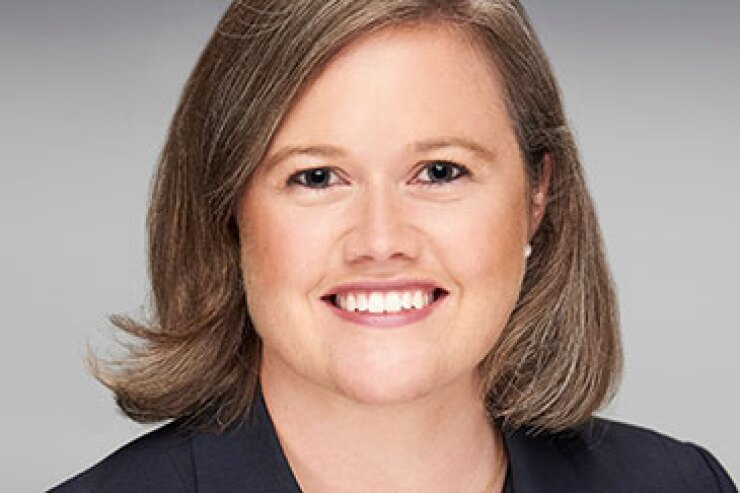
WASHINGTON – Securities and Exchange Commission enforcement officials are expected to focus on disclosure and pricing abuses as well as increased oversight of municipal advisors during the coming year, according to regulators and market participants.
However the departures of SEC chair Mary Jo White and enforcement division director Andrew Ceresney, who have been responsible for many first-of-a-kind cases in the municipal bond market, may slow commission activity for a while.
White announced she will step down when President Obama leaves in January, and her aggressive, "broken windows" approach to enforcement may go with her, sources said. White believed even the smallest infractions should be pursued to show an intolerance for all bad behavior. Ceresney announced plans to leave the SEC by the end of the year.
These key departures will subtract from an already depleted commission. The SEC has been operating with only three of five commissioners for roughly a year. With White's departure, only two commissioners will be left until new ones are nominated and confirmed. Commissioner Michael Piwowar, a Republican and former chief economist for the Senate Banking Committee who was involved in some muni pricing studies, would most likely be designated as the acting chair. Commissioner Kara Stein, a Democrat who was senior policy advisor for securities and banking to Sen. Jack Reed, D-R.I., would remain in her position until at least June 2017 when her term expires.
Elaine Greenberg, a shareholder with the law firm Greenberg Traurig here and former SEC muni enforcement chief, said that if the SEC falls to only two commissioners, it could limit the number of enforcement actions that get through the commission.
"Unless they both agree on a particular enforcement action, that action isn't going anywhere," Greenberg said. That problem is most likely to become apparent if there are cases based on rules that may not be perceived as being very clear or were only approved recently, according to Greenberg.
"Those areas that people view to be regulation by enforcement [or] those that don't rise to the level of clear fraudulent conduct may have a more difficult time getting through the approval process," she said, adding that such difficulties would also likely exist to some extent with a full panel of commissioners.
Enforcement Roadmap
For areas of the municipal market that are more likely to get attention, Greenberg referred to a November letter from the Municipal Securities Rulemaking Board to the SEC's Investor Advocate. In the letter, the MSRB said retail investors in munis would benefit from improvements in disclosure practices, price fairness, and transparency. The letter also touched on the importance of protecting senior investors.
"I look at that list as being a possible roadmap for SEC enforcement to follow," Greenberg said, adding that Piwowar's past attention to issues of pricing make that an especially likely area of focus.
Paul Maco, a partner with the law firm Bracewell here, noted that another focus that runs through Piwowar's prior speeches and statements is that individuals, not entities, commit or conspire to commit violations and should be held responsible.
"This focus on individuals I don't think is going to go away," Maco said.
LeeAnn Gaunt, chief of the public finance abuse unit, which handles municipal enforcement, said the same thing, that the market will continue to see enforcement officials holding individuals accountable, something that has become a regular part of nearly every action the unit's attorneys bring.
Maco also said that a bill Rep. Jeb Hensarling, R-Texas, proposed in the most recent congressional session may hold a key to some of the changes that enforcement, both in the municipal securities market and elsewhere, might bring.
The bill, called the Financial CHOICE Act, would allow the SEC to triple monetary fines in administrative and civil actions where penalties are tied to illegal profits as well as in enforcement cases dealing with repeat violators of laws and rules. It would also allow someone facing charges before an SEC administrative law judge to remove the case from the administrative court and transfer it to federal court.
The wide-ranging bill is meant to serve as a vehicle to roll back and change the regulations the Dodd-Frank Act put on financial markets. It was approved by the House Financial Services Committee that Hensarling chairs, but did not progress further before the end of the session. Hensarling has said he intends to review and improve upon the legislation before pursuing it again in the next congressional session.
Ernesto Lanza, senior counsel with Clark Hill here, said that even with possible changes in enforcement policy and an expected administration-wide agenda of deregulation, he does not expect "a plummet in enforcement actions."
"To the extent rulemaking becomes more difficult, enforcement is still the other arrow [regulators] have in their quiver," Lanza said. "It is a lot harder for someone to constrain enforcement actions. Enforcement is always going to be there as a tool for the SEC."
MCDC
Gaunt said that even though the SEC has concluded its Municipalities Continuing Disclosure Cooperation initiative, it plans to now go after underwriters and issuers that did not voluntarily self-report violations under MCDC.
MCDC promised underwriters and issuers would receive lenient settlement terms if they self-reported instances over the last five years where issuers falsely said in offering documents that they were in compliance with their continuing disclosure agreements. In total, the initiative led to settlements with 72 issuers, including Kings Canyon Joint Unified School District in 2014, and 72 underwriters.
Gaunt said underwriters and issuers that did not voluntarily report violations under MCDC are "of particular interest to us" and that the unit's lawyers "intend to devote significant resources to identifying violations by those parties."
Lanza said he expects the follow-up to the initiative will include a firm or an issuer that committed continuing disclosure violations at some point after the initiative was announced.
"I have to assume they're going to find at least one or two cases where someone just didn't get the message," he said.
The SEC's decision to follow up with non-reporters is not surprising given past comments from its officials that they intended to do so and in fairness to those underwriters and issuers that did self-report, Greenberg said. The SEC needs to bring "at least a few actions" with at least one against an underwriter and one against an issuer, she said.
Michael Decker, managing director and co-head of municipal securities for the Securities Industry and Financial Markets Association, said that every SIFMA firm he has talked to self-reported potential violations under the initiative. "I wouldn't be surprised if there were firms that didn't self-report, but I haven't heard of any," he said.
SEC officials also have said they may pursue individuals who were involved in the transactions reported under MCDC.
Emily Brock, director of the Government Finance Officers Association's federal liaison center said that threat has put issuer officials on edge because they may be subject to an enforcement action.
"Going forward, I think that's a real fear and so I'm hoping that we continue to have dialogue with the SEC to have a better understanding about their approach and to ensure that as we talk with finance directors and [chief financial officers] of small, mid-sized, and large jurisdictions about what exactly there is to be expected," said Brock, adding, "We might be able to play a role in educating folks."
Brock said that MCDC led to some frustration in the issuer community. While the SEC did not disclose the numbers of underwriters and issuers that reported violations under MCDC, many assume far more issuers reported than settled.
"The timing is unfortunate that such a small group of the much larger issuer community will be subject to the terms of the issuer settlements for many years," Brock said. The settlements require the issuers to give notice of their violations in future offering statements.
Besides the follow-up to MCDC and disclosure issues, the SEC public finance abuse unit is concerned about broker-dealer abuses, public corruption, and municipal advisors, according to Gaunt. She said she expects the unit's lawyers will focus on those areas in 2017.
Municipal Advisors
Several market participants said they expect the unit will bring more cases against municipal advisors as those regulated firms and individuals become responsible for complying with new rules and are subject to examinations by the SEC's Office of Compliance, Inspections, and Examinations.
Susan Gaffney, executive director of the National Association of Municipal Advisors, said NAMA expects more MA enforcement actions as the OCIE exams continue. The group wants to learn about the OCIE enforcement staff's findings to help MAs make sure they are adhering to rules and not engaging in violations.
Leo Karwejna, chief compliance officer with The PFM Group, a non-dealer MA, said the enforcement will be helpful for two reasons.
"The bad actors that are out there I believe should be brought to task and I also think it helps the industry and the marketplace as a whole to … not find themselves in similar circumstances," he said.
Most agreed that any MA actions would be very facts-and-circumstances-driven and would generally result only from the most egregious conduct the commission may find.
Maco said that MA enforcement "certainly has the potential to be broad ranging" and could cover not just conflicts of interest violations but also other fiduciary duty violations and disclosure issues.
"I think a disclosure-based charge for an MA would be very fact-dependent," Maco said. "If they were going to do something in that area, having a strong set of facts would certainly benefit the message …. If it's borderline, that could be problematic."
Lanza said he would like to think the cases the unit brings would avoid close calls for "this first time through." He said there is a good chance that by the end of 2017, the SEC will have brought at least some MA actions to let people know that they are watching and active in the area.
He also said, echoing others, that the commission, possibly through OCIE, may release a risk alert or some other notice informing the market about what staff members have found during their examinations.
"That would be a service to the market and it would be consistent with what they've done in the past," Lanza said.
Dave Sanchez, senior counsel with Norton Rose Fulbright in San Francisco and a former SEC muni official, said that while it may be tempting for the commission to pursue MA rules in enforcement actions, "the real issue is the SEC still has to figure out where they're spending their enforcement resources and who is actually doing the most harm."
"It's very tempting to say, 'Because we have these new municipal advisor rules, we should put all of our enforcement resources on them,' but that doesn't necessarily make the most sense if the violations you're seeing are just foot faults like people missing a filing deadline," Sanchez said.
Gaunt said the unit's staff recognizes the importance of having enforcement serve a programmatic interest. She added that addressing such programmatic areas that are important to the market "is one of the factors we would consider when deciding whether an enforcement action is appropriate in any particular situation."





